This article needs additional citations for verification .(July 2007) |
"Roog" is a science fiction short story by American writer Philip K. Dick. It was his first sold work, although not his first published story. [1]
This article needs additional citations for verification .(July 2007) |
"Roog" is a science fiction short story by American writer Philip K. Dick. It was his first sold work, although not his first published story. [1]
"Roog" is a story told from the point of view of a dog named Boris, who observes his masters carefully storing food in containers outside of their house day after day. Unbeknownst to the dog, these are the humans' garbage cans. The dog is later horrified to witness some food being "stolen" by garbage men who the dog believes are predatory carnivores from another planet. The dog comes to know these beings as "Roogs', and tries to warn his master of each "theft" with cries of "Roog! Roog!" The humans, unable to comprehend the hound's message, think the dog is just being rowdy. Thus, they attribute the sound the dog makes to be the sound that all dogs make when they are excited, "Roog! Roog!" The tale concludes with the animal being somewhat distraught, barking "ROOG!" very loudly at the garbage men before they make off once more with trash in their garbage truck.
The inspiration for Boris, the dog in "Roog", was based on a real dog named Snooper, who belonged to one of Dick's neighbors. [2] [3] Snooper would become very alarmed every time the garbage men arrived to pick up trash, and this inspired Dick to write the short story.
"Roog" was written in November 1951 [1] and appeared in The Magazine of Fantasy & Science Fiction (February 1953, page 123) without illustrations. [4] During this time Dick worked in a record store. In an essay prefacing a collection of his short stories published in 1978, Dick recalled the story's gestation, as well as discussing its plot, its general themes and his reaction at the time. Dick relates that he contacted Anthony Boucher, a sci-fi/fantasy publisher, editor and fellow writer whom Dick recalls as a kind friend. Dick wrote, "Without [Boucher's] help I'd still be in the record business. I mean that very seriously." As a young man, Dick was very pleased with the publication, and wondered if he could quit his job at the record store and work full-time as an author, while the older Dick (27 years on) dismissed that aspiration as delusional.[ citation needed ]
Soon after the original publication of "Roog", Boucher attempted to get it published once more, in a science fiction anthology being compiled by a person Dick refers to as "Ms. J.M." (Judith Merrill Interview with Lupoff). However, she disliked the story, finding it obscure and hard to understand. She also criticized Dick's description of the garbage men as inaccurate, apparently unable to see that the description is from the protagonist dog's perspective. Despite Dick explaining the story in a letter to J.M. regarding the themes of the work, she rejected the story. Boucher, however, proceeded to publish it, and it remains in print, at one time even appearing in a high school literature textbook.
Dick regarded Roog as "quite a serious story". Dick explained in the introduction to The Collected Stories of Philip K. Dick that "Roog" "tells of fear, it tells of loyalty, it tells of obscure menace and a good creature who cannot convey knowledge of that menace to those he loves". [2] Furthermore, Aaron Barlow suggests an insightful connection of the story to the nature and themes of his writings:
By the end of "Roog," however, Dick has encouraged speculation that the "garbagemen" really might be aliens held off by dogs the aliens call "Guardians.”
Boris faces two problems. First, though he barks that "Roogs" are coming, no one understands. He cannot communicate his warning. Second, his "Roogs" may be a delusion instead of a real danger. Boris cannot tell which; he doesn't even know that he could, in fact, be wrong. He has seen the paperboy and barked at him, taking him, without any evidence, as a Roog. [...]
Dick gives no hint of any "truth" behind Boris's subjective perceptions. Whatever the case, Boris's inability to communicate his concern leaves the matter moot and leads him to fear the breakdown of his world of suburban dog-life—and leads Dick to think about Boris's situation in human terms. [...]
As a dog, Boris views the human world through the blanket distortion of canine point-of-view. Yet what he sees subjectively may be "real" — just as it may be a mask or a deception created through his own limited perceptual abilities. That these "may"s exist concerned Dick a great deal. Perhaps the blanket distortion of human point-of-view makes experience as difficult for us to decipher as for Boris.
Perhaps Boris, finally, is something like the poor fantasy writer no one listens to. Like, hmm, Phil Dick. Like any struggler for communication, particularly for communication that transcends individual, varied perception. [5]

Philip Kindred Dick, often referred to by his initials PKD, was an American science fiction writer. He wrote 44 novels and about 121 short stories, most of which appeared in science fiction magazines during his lifetime. His fiction explored varied philosophical and social questions such as the nature of reality, perception, human nature, and identity, and commonly featured characters struggling against elements such as alternate realities, illusory environments, monopolistic corporations, drug abuse, authoritarian governments, and altered states of consciousness. He is considered one of the most important figures in 20th century science fiction.
"The Father-Thing" is a 1954 science fiction short story by American writer Philip K. Dick. The story, told through third-person narration but focusing on the child, concerns the replacement of a boy's father with a replicated version. At first, only the child sees the difference and has to recruit other children to help him reveal the truth. The story is typical of Dick's short stories of the period.
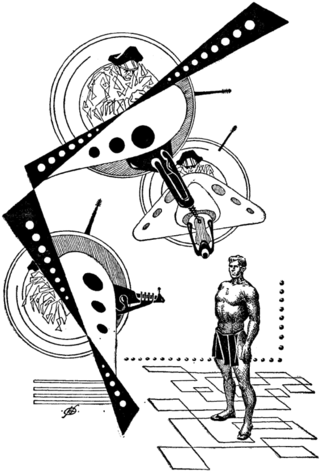
"The Golden Man" is an 11,600-word science fiction short story by American writer Philip K. Dick. It was received by the Scott Meredith Literary Agency on June 24, 1953, and first published in the April 1954 issue of If magazine. The story was illustrated by Kelly Freas in its original publication. The story is set in a post-apocalyptic future where the existence of potentially powerful mutants has become a reality. The mutants are seen as dangerous and have been hunted to death by human beings for years. A golden-skinned mutant called Cris is captured by the government, which attempts to execute him. However, his appearance and abilities to see into the future allow him to escape.
"The Last of the Masters" is a science fiction novelette by American writer Philip K. Dick. The original manuscript of the story was received by the Scott Meredith Literary Agency on July 15, 1953, and the story was published by the Hanro Corporation in the final issue of Orbit Science Fiction in 1954. It has since been reprinted in several Philip K. Dick story collections, beginning with The Golden Man in 1980.
"The Exit Door Leads In" is a science fiction short story by American writer Philip K. Dick. First published in 1979.
"The Electric Ant" is a science fiction short story by American writer Philip K. Dick. It was first published in Fantasy and Science Fiction magazine in October 1969.
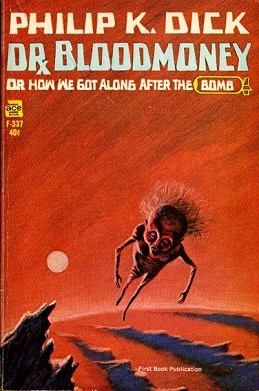
Dr. Bloodmoney, or How We Got Along After the Bomb is a 1965 science fiction novel by American writer Philip K. Dick. It was nominated for the Nebula Award for Best Novel in 1965.
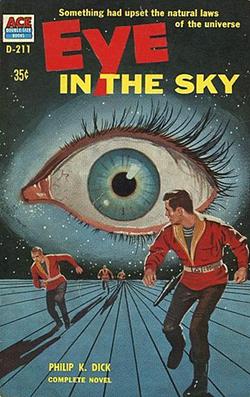
Eye in the Sky is a science fiction novel by American writer Philip K. Dick, originally published in 1957.
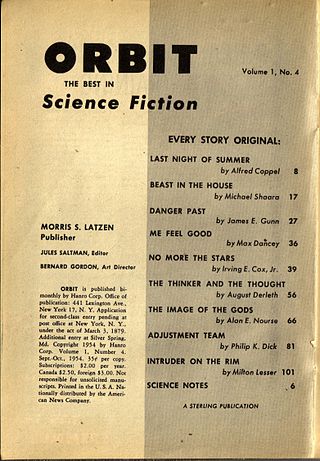
"Adjustment Team" is a science fiction short story by American writer Philip K. Dick. It was first published in Orbit Science Fiction with illustration by Faragasso. It was later reprinted in The Sands of Mars and Other Stories (Australian) in 1958, The Book of Philip K. Dick in 1973, The Turning Wheel and Other Stories in 1977, The Collected Stories of Philip K. Dick in 1987 (Underwood–Miller), 1988, 1990, Selected Stories of Philip K. Dick in 2002 and in The Early Work of Philip K. Dick, Volume One: The Variable Man & Other Stories in 2009.

The Body Snatchers is a science fiction novel by American writer Jack Finney, originally serialized in Collier's magazine in November–December 1954 and published in book form the following year.
Paranoid fiction is a term sometimes used to describe works of literature that explore the subjective nature of reality and how it can be manipulated by forces in power. These forces can be external, such as a totalitarian government, or they can be internal, such as a character's mental illness or refusal to accept the harshness of the world they are in.

The Preserving Machine is a collection of science fiction stories by American writer Philip K. Dick. It was first published by Ace Books in 1969 with cover art by Leo and Diane Dillon as part of their Ace Science Fiction Specials series. The stories had originally appeared in the magazines Fantasy and Science Fiction, Galaxy Science Fiction, Beyond Fantasy Fiction, If, Amazing Stories, Planet Stories, Worlds of Tomorrow, Imagination and Satellite.

The Best of Philip K. Dick is a collection of science fiction stories by American writer Philip K. Dick. It was first published by Del Rey Books in 1977 as a volume in its Classic Library of Science Fiction. Many of the stories had originally appeared in the magazines Planet Stories, Fantasy and Science Fiction, Space Science Fiction, Imagination, Astounding Stories, Galaxy Science Fiction, Amazing Stories, Science Fiction Stories and Startling Stories, as well as the anthologies Dangerous Visions and Star Science Fiction Stories No.3.

The Collected Stories of Philip K. Dick is a collection of 118 science fiction stories by American writer Philip K. Dick. It was first published by Underwood-Miller in 1987 as a five volume set. See Philip K. Dick bibliography for information about the mass market reprints.
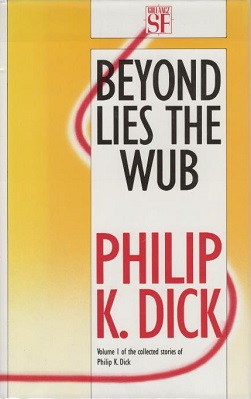
Beyond Lies the Wub is a collection of science fiction stories by American writer Philip K. Dick. It was first published by Gollancz in 1988 and later comprised Volume I of The Collected Stories of Philip K. Dick. Many of the stories had originally appeared in the magazines Fantasy and Science Fiction, Planet Stories, If, Galaxy Science Fiction, Imagination, Space Science Fiction, Fantastic Story Magazine, Amazing Stories, Future, Cosmos, Fantasy Fiction, Beyond Fantasy Fiction, Thrilling Wonder Stories, Startling Stories. The collection was reprinted by Citadel Press in 2003 under the title Paycheck and Other Classic Stories.

The Short Happy Life of the Brown Oxford is a collection of science fiction stories by American writer Philip K. Dick. It was first published by Citadel Twilight in 1990 and reprints Volume I of The Collected Stories of Philip K. Dick. Many of the stories had originally appeared in the magazines Fantasy and Science Fiction, Planet Stories, If, Galaxy Science Fiction, Imagination, Space Science Fiction, Fantastic Story Magazine, Amazing Stories, Future, Cosmos, Fantasy Fiction, Beyond Fantasy Fiction, Thrilling Wonder Stories and Startling Stories. The collection was reprinted by Citadel Press in 2003 under the title Paycheck and Other Classic Stories.
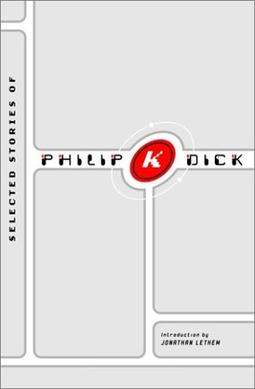
Selected Stories of Philip K. Dick is a collection of science fiction stories by Philip K. Dick. It was first published by Random House in 2002. Many of the stories had originally appeared in the magazines Planet Stories, Fantasy and Science Fiction, Imagination, Space Science Fiction, Astounding, Beyond Fantasy Fiction, Orbit, Galaxy Science Fiction, Fantastic Universe, Amazing Stories, Rolling Stone College Papers, Omni and Playboy.
"Retreat Syndrome" is a 1965 short story by American writer Philip K. Dick. The story contains some common Dick themes such as a questionable reality and drug use. It was first published in Worlds of Tomorrow Science Fiction and was later reprinted the collections The Preserving Machine (1969), The Preserving Machine and Other Stories (1977), We Can Remember It For You Wholesale (2000) and The Eye of the Sibyl and Other Stories (2004).
"The Great C" is a science fiction short story by American writer Philip K. Dick, first published in Cosmos Science Fiction and Fantasy Magazine in 1953. It has since been republished several times in collections such as Beyond Lies the Wub in 1988. Parts of the work, along with Planet for Transients, were later used in the full-length novel Deus Irae. The story is set in a post-apocalyptic world in which a young man is sent from his tribe every year to visit a godlike computer capable of mass destruction and try to stump it with three questions. The story was adapted into an animated virtual reality film in 2018 by Secret Location.

Dogtales! is a themed anthology of science fiction short works edited by American writers Jack Dann and Gardner Dozois. It was first published in paperback by Ace Books in September 1988. It was reissued as an ebook by Baen Books in June 2013.